Difference between revisions of "Edit zenith and nadir in one go with PTGui"
m (Added content and images) |
Erik Krause (talk | contribs) m (adapted to recent PTGui) |
||
| (19 intermediate revisions by 4 users not shown) | |||
| Line 1: | Line 1: | ||
== General == | == General == | ||
| + | Here I show you a fast way to retouch zenith and nadir in one go.<br> | ||
| + | Use this method only if you have a proper stitched panorama and only<br> | ||
| + | the top (zenith) and bottom (nadir) areas need some retouching.<br> | ||
| + | Otherwise use other technics as described under<br> | ||
| + | [[Extracting and inserting rectilinear Views]] and [[How to use PTEditor]].<br> | ||
| + | <br> | ||
| + | <br> | ||
| + | <br> | ||
== Workflow == | == Workflow == | ||
| − | === Remap to zenith and | + | === Remap to zenith and nadir view === |
| − | + | <br> | |
| − | + | <br> | |
| − | [[Image:PTGUIret_001.jpg]] | + | Open PTGui and add one spherical panorama. As you can see the source pano is 6000 x 3000 pixels in size:<br> |
| − | + | <br> | |
| − | [[Image:PTGUIret_002.jpg]] | + | [[Image:PTGUIret_001.jpg]]<br> |
| − | + | <br> | |
| − | [[Image:PTGUIret_003.jpg]] | + | <br> |
| − | + | <br> | |
| − | [[Image:PTGUIret_004.jpg]] | + | On the '''Lens Setting''' tab add the yellow highlighted values:<br> |
| − | + | <br> | |
| − | [[Image:PTGUIret_005.jpg]] | + | [[Image:PTGUIret_002.jpg]]<br> |
| − | + | <br> | |
| − | + | <br> | |
| − | + | <br> | |
| − | [[Image: | + | On the '''Panorama Settings''' tab add the yellow highlighted values: <small>"Use fast transform" has now moved to "Create Panorama" tab.</small><br> |
| − | + | <br> | |
| − | + | [[Image:PTGUIret_003.jpg]]<br> | |
| + | <br> | ||
| + | <br> | ||
| + | <br> | ||
| + | On the '''Image parameters''' tab add the yellow highlighted values and you can immediately see the remapping of the image:<br> | ||
| + | <br> | ||
| + | [[Image:PTGUIret_004.jpg]]<br> | ||
| + | <br> | ||
| + | <br> | ||
| + | <br> | ||
| + | Enable '''Lock width and height''', press '''Set optimum size''' button, choose '''Maximum size''' and compare the values with the original size of the panorama. <small>"Lock width and height" was called "Lock aspect ratio" in older versions.</small><br> | ||
| + | Choose as output file format '''TIFF (.tif)''' for fewer quality loss. Press '''Create Panorama''' to start the remapping process:<br> | ||
| + | <br> | ||
| + | [[Image:PTGUIret_005.jpg]]<br> | ||
| + | <br> | ||
| + | <br> | ||
| + | <br> | ||
| + | You don't have to add control points and optimize in this case, so press '''OK'''.<br> | ||
| + | <br> | ||
| + | [[Image:PTGUIret_006.jpg]]<br> | ||
| + | <br> | ||
| + | <br> | ||
| + | <br> | ||
=== Retouching zenith and nadir in one go === | === Retouching zenith and nadir in one go === | ||
| + | <br> | ||
| + | Here you see the remapped panorama opened in Photoshop. The yellow circles mark zenith and nadir as nearly flat regions.<br> | ||
| + | It is now much easier to retouch these regions.<br> | ||
| + | <br> | ||
| + | [[Image:PTGUIret_008.jpg]]<br> | ||
| + | <br> | ||
| + | <br> | ||
| + | <br> | ||
| − | + | === Remapping back to normal view === | |
| − | + | <br> | |
| − | + | Open the retouched panorama again in PTGui with the same values under '''Lens Settings''' and '''Panorama Settings'''.<br> | |
| − | + | Fill in the yellow highlighted values under '''Yaw''' and '''Roll'''.<br> | |
| − | === Remapping back to | + | The '''Warped''' view changes imediately to the original projection.<br> |
| − | + | <br> | |
| − | + | [[Image:PTGUIret_010.jpg]]<br> | |
| − | [[Image:PTGUIret_010.jpg]] | + | <br> |
| − | + | <br> | |
| − | [[Image:PTGUIret_011.jpg]] | + | <br> |
| + | Change the values as below, alter output file name to your needs and press '''Create Panorama!'''<br> | ||
| + | <br> | ||
| + | [[Image:PTGUIret_011.jpg]]<br> | ||
| + | If you want the best possible quality, follow the next steps. Otherwise you are done here.<br> | ||
| + | <br> | ||
| + | <br> | ||
| + | <br> | ||
| + | == Merging with most quality == | ||
| + | Open the retouched, spherical pano in Photoshop and take a look at the layer palette.<br> | ||
| + | Drag and drop the background layer over the '''new layer''' icon to make a copy of it:<br> | ||
| + | <br> | ||
| + | [[Image:PTGUIret_012.jpg]]<br> | ||
| + | <br> | ||
| + | <br> | ||
| + | <br> | ||
| + | Here you can see an additional layer as copy of the background.<br> | ||
| + | Now drag and drop background layer over the '''recycle bin''' icon at the bottom of the<br> | ||
| + | layer palette to delete it:<br> | ||
| + | <br> | ||
| + | [[Image:PTGUIret_013.jpg]]<br> | ||
| + | <br> | ||
| + | <br> | ||
| + | <br> | ||
| + | Rename the existing layer to '''zenith and nadir''' by double clicking its layer name:<br> | ||
| + | <br> | ||
| + | [[Image:PTGUIret_014.jpg]]<br> | ||
| + | <br> | ||
| + | <br> | ||
| + | <br> | ||
| + | Choose the '''Marquee Tool''' and change the feather width to 40:<br> | ||
| + | <br> | ||
| + | [[Image:PTGUIret_015.jpg]]<br> | ||
| + | <br> | ||
| + | <br> | ||
| + | <br> | ||
| + | Set the grid under '''Edit > Preferences > Guides, Grids & Slices > Gridline every''' to '''50%'''<br> | ||
| + | and '''Subdivison''' to '''1'''. Left click the grid cross in the middle of the pano and drag the selection<br> | ||
| + | square to the most right side by holding '''Alt''' key until it looks like the image below and then release the left<br> | ||
| + | mouse button:<br> | ||
| + | <br> | ||
| + | [[Image:PTGUIret_016.jpg]]<br> | ||
| + | <br> | ||
| + | <br> | ||
| + | <br> | ||
| + | Press '''Delete''' key that only zenith and nadir region of the retouched pano will stay:<br> | ||
| + | <br> | ||
| + | [[Image:PTGUIret_017.jpg]]<br> | ||
| + | To delete the rectangle selection, press Ctrl+D.<br> | ||
| + | <br> | ||
| + | <br> | ||
| + | <br> | ||
| + | <br> | ||
| + | Open the original pano. Switch to the retouched pano and press '''Ctrl+A''' to select the whole image.<br> | ||
| + | Change to '''Move Tool''' and drag and drop the retouched pano over the original<br> | ||
| + | pano by holding '''Shift''' key to align it proper.<br> | ||
| + | <br> | ||
| + | [[Image:PTGUIret_018.jpg]]<br> | ||
| + | <br> | ||
| + | <br> | ||
| + | <br> | ||
| + | Now you can see two layers in the original file, the original background layer and<br> | ||
| + | on top of that, the dropped layer.<br> | ||
| + | <br> | ||
| + | [[Image:PTGUIret_019.jpg]]<br> | ||
| + | <br> | ||
| + | <br> | ||
| + | <br> | ||
| + | Flatten these layers to background under '''Layer > Flatten Image''' :<br> | ||
| + | <br> | ||
| + | [[Image:PTGUIret_020.jpg]]<br> | ||
| + | <br> | ||
| + | <br> | ||
| + | <br> | ||
| + | You are done now, but don't forget to save the panorama with a different name:<br> | ||
| + | <br> | ||
| + | [[Image:PTGUIret_021.jpg]]<br> | ||
| + | <br> | ||
| + | <br> | ||
| + | <br> | ||
| + | [[User:Pitdavos|Peter Nyfeler]] (Pitdavos) | ||
| − | + | [[Category:Tutorial:Nice to know]] | |
Latest revision as of 14:17, 4 December 2007
General
Here I show you a fast way to retouch zenith and nadir in one go.
Use this method only if you have a proper stitched panorama and only
the top (zenith) and bottom (nadir) areas need some retouching.
Otherwise use other technics as described under
Extracting and inserting rectilinear Views and How to use PTEditor.
Workflow
Remap to zenith and nadir view
Open PTGui and add one spherical panorama. As you can see the source pano is 6000 x 3000 pixels in size:
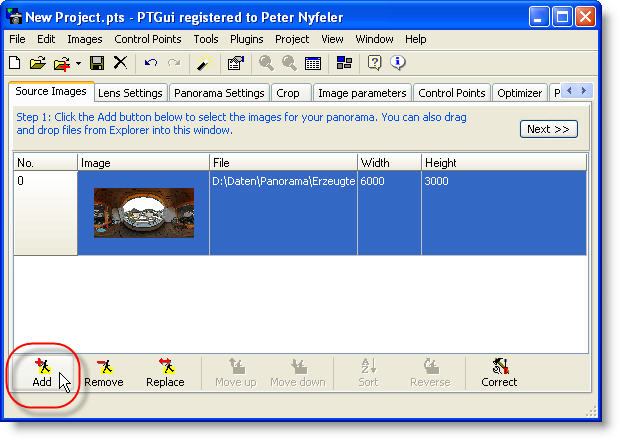
On the Lens Setting tab add the yellow highlighted values:
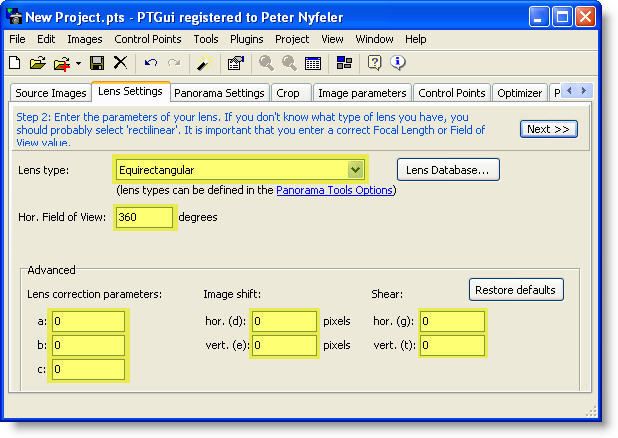
On the Panorama Settings tab add the yellow highlighted values: "Use fast transform" has now moved to "Create Panorama" tab.
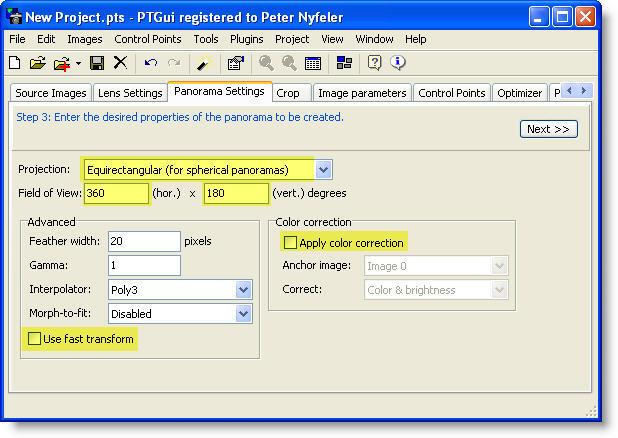
On the Image parameters tab add the yellow highlighted values and you can immediately see the remapping of the image:
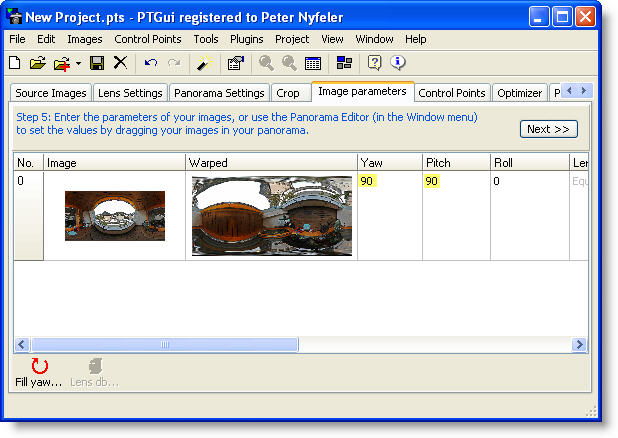
Enable Lock width and height, press Set optimum size button, choose Maximum size and compare the values with the original size of the panorama. "Lock width and height" was called "Lock aspect ratio" in older versions.
Choose as output file format TIFF (.tif) for fewer quality loss. Press Create Panorama to start the remapping process:
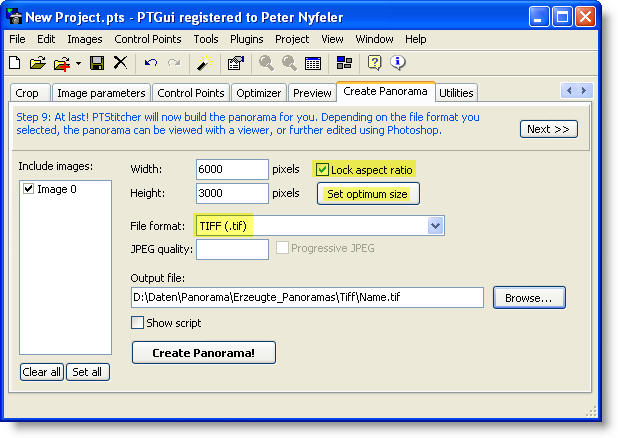
You don't have to add control points and optimize in this case, so press OK.

Retouching zenith and nadir in one go
Here you see the remapped panorama opened in Photoshop. The yellow circles mark zenith and nadir as nearly flat regions.
It is now much easier to retouch these regions.
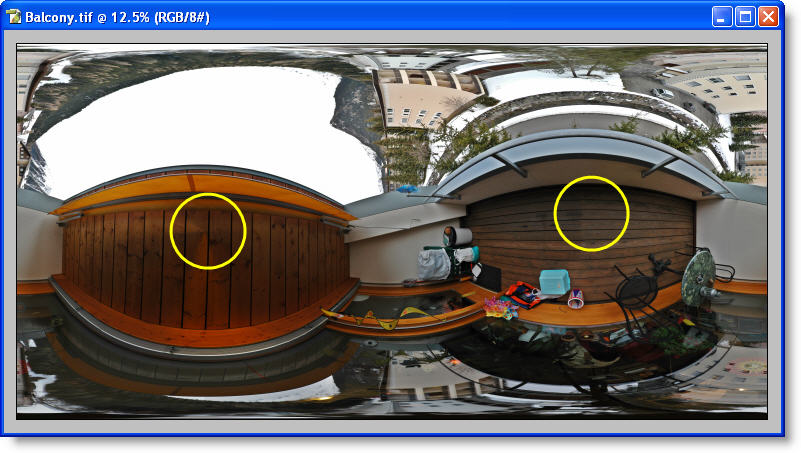
Remapping back to normal view
Open the retouched panorama again in PTGui with the same values under Lens Settings and Panorama Settings.
Fill in the yellow highlighted values under Yaw and Roll.
The Warped view changes imediately to the original projection.
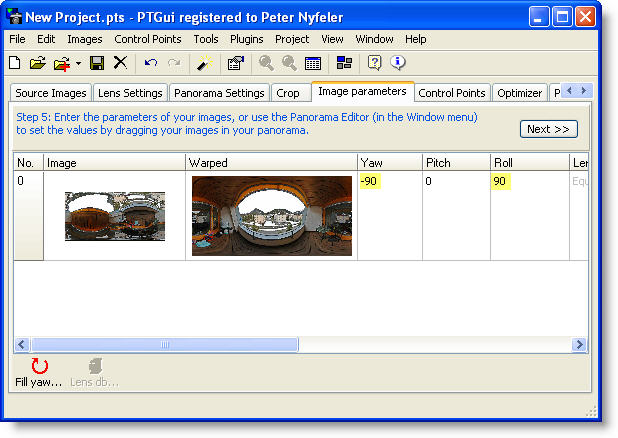
Change the values as below, alter output file name to your needs and press Create Panorama!
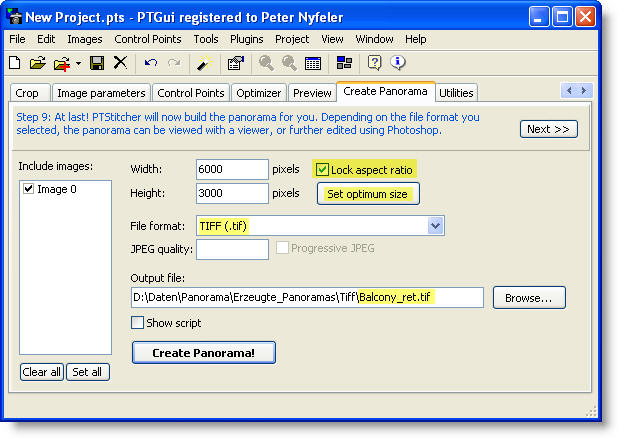
If you want the best possible quality, follow the next steps. Otherwise you are done here.
Merging with most quality
Open the retouched, spherical pano in Photoshop and take a look at the layer palette.
Drag and drop the background layer over the new layer icon to make a copy of it:
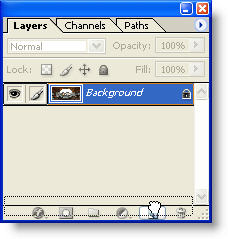
Here you can see an additional layer as copy of the background.
Now drag and drop background layer over the recycle bin icon at the bottom of the
layer palette to delete it:
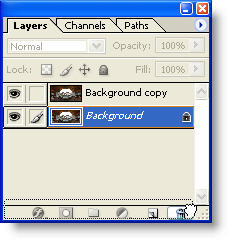
Rename the existing layer to zenith and nadir by double clicking its layer name:
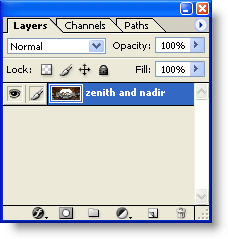
Choose the Marquee Tool and change the feather width to 40:

Set the grid under Edit > Preferences > Guides, Grids & Slices > Gridline every to 50%
and Subdivison to 1. Left click the grid cross in the middle of the pano and drag the selection
square to the most right side by holding Alt key until it looks like the image below and then release the left
mouse button:
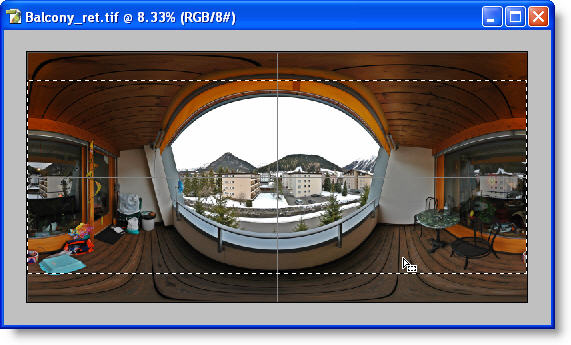
Press Delete key that only zenith and nadir region of the retouched pano will stay:
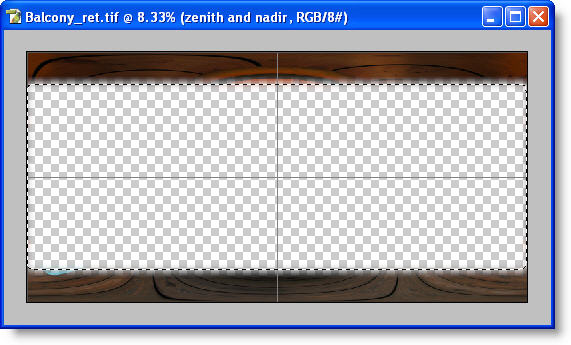
To delete the rectangle selection, press Ctrl+D.
Open the original pano. Switch to the retouched pano and press Ctrl+A to select the whole image.
Change to Move Tool and drag and drop the retouched pano over the original
pano by holding Shift key to align it proper.
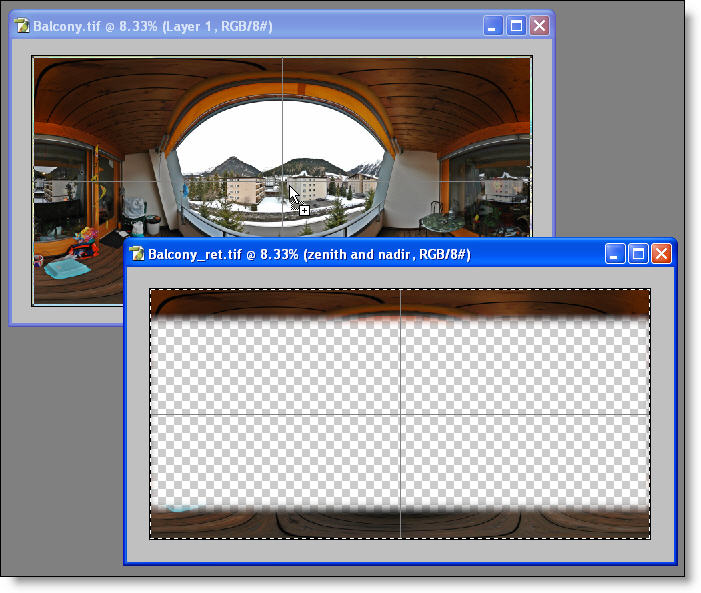
Now you can see two layers in the original file, the original background layer and
on top of that, the dropped layer.
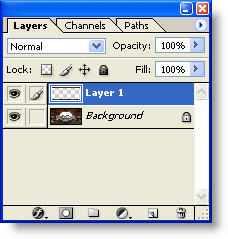
Flatten these layers to background under Layer > Flatten Image :

You are done now, but don't forget to save the panorama with a different name:
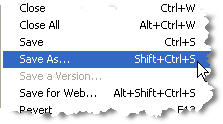
Peter Nyfeler (Pitdavos)